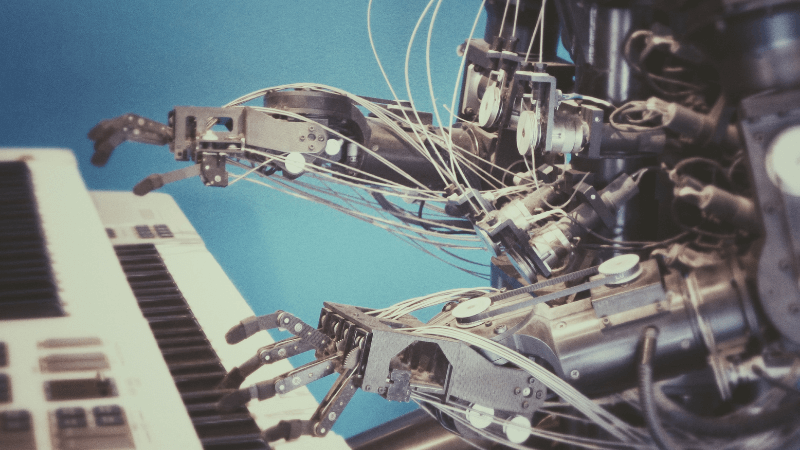Automation, artificial intelligence, and robotics are advancing rapidly, leading to major changes in companies both in terms of processes and available jobs. Artificial intelligence has great potential to support the development of these processes.
In business, artificial intelligence has a wide range of uses. In fact, most of us interact daily with it in one form or another. As technology evolves, it becomes mandatory for companies to integrate it into their current business if they want to maintain a competitive advantage.

In which areas can AI help you?
1. Customer service
A lot of companies know how important it is for the interaction with the customer relations department to be a positive one. If customers are not satisfied, regardless of why they contacted the company, it may be affected. Many people completely give up a company’s products and services even after a single unpleasant experience.
Artificial intelligence has allowed the creation of chatbots. A chatbot is an artificial intelligence program that can simulate a conversation (or chat) with a user in natural language through a messaging application, a website, mobile application, or phone. Chatbots streamline customer-company interactions, helping to improve the shopping experience. At the same time, they offer companies new opportunities to improve customer engagement and operational efficiency by reducing the overall cost of customer service.
2. Marketing and sales
Artificial intelligence creates key opportunities that lead to better alignment between marketing and sales, resulting in increased revenue and a much better pipeline.
Artificial intelligence supports and helps provide personalized customer experiences on a large scale. It can also be involved in the process of qualifying and prioritizing sales leads, which saves a lot of resources. In addition, based on data obtained from customer interactions and historical data, analyzes and forecasts and customer profiles can be made to help improve sales and promotion strategies among potential customers.
3. Human resources
AI automated many human resource business processes that were repetitive and time-consuming. Artificial intelligence-powered software can analyze hundreds of networking sites for jobs by browsing candidates’ online presence and can predict how likely they are to accept an offer. The integration of AI in the recruitment process offers an impartial perspective, devoid of human emotions. In addition, it reduces the number of human errors and improves compliance with the requirements.
Also, analyzes can be performed on the human resources already existing in the company, in order to see the personnel performance, the fluctuation, the processes, and the strategies on which the organization can channel time and money.
4. Management
Artificial intelligence has the ability to simplify management processes and complete them faster and more efficiently. If managers can avoid repetitive, low-value tasks, they can spend more time focusing on the “human” side of the business, which cannot be replaced. Artificial intelligence will automate those tasks.
5. Retail
The use of artificial intelligence in retail offers customers a personalized shopping experience. As digital and physical purchasing channels merge, retailers that can innovate will stand out from the market.
With the help of complex algorithms, shopping applications and sites can predict and get results based on previous searches – offering customers additional buying options based on behavior patterns. From customizing real-time promotions to applying automated inventory management, merchants can use AI to connect better with their customers and operate more efficiently. In the face of a wealth of information on all aspects of business, from supply chains to stores to consumers, retailers need to “filter the noise” to turn these disparate data sources into strategies that focus on consumers.
6. Manufacturing
In the production process, AI can perform quality control and diagnostics to ensure that equipment and installations operate smoothly and efficiently. AI and machine learning can be used to create more accurate demand forecasts, optimizing manufacturing processes and more. With the help of such a system, manufacturers can detect manufacturing errors much faster, thus ensuring a much more rigorous quality control. For example, image processing algorithms can validate whether a product was produced according to standards.
7. Banking
Banks use artificial intelligence on three main channels to reduce costs: front office (conversational banking), middle office (fraud detection and risk management) and back office (underwriting). Banks use algorithms to identify and authenticate customers as easily as possible, imitate employees through chatbots and voice assistants, provide personalized information and recommendations. Also, with the help of AI, banks can manage huge volumes of data at a record speed to obtain valuable information from it.
8. Healthcare
Artificial intelligence simplifies the lives of doctors, patients, and hospital administrators by performing tasks that usually fall to people, but in less time and at a fraction of the cost. Incomplete medical history and caseloads can lead to fatal human error. With existing data, AI can predict and diagnose the disease at a faster rate than most medical professionals.
Are you a beginner in AI?
We have prepared for you an article that will explain the basics of it.
How does AI empower your business? A few benefits:

- Analysis of consumer behavior, creating forecasts and product recommendations;
- Improving the interaction and buying experience for customers;
- Automation and optimization of processes, data transfers, and synchronizations, file updating;
- Providing business insights following data analysis;
- Optimizing the employment process;
- Making increasingly accurate forecasts, based on data;
- Increased security, detecting fraud attempts;
- Improved customer service, automating interactions with them;
- Increased productivity and operational efficiency;
- Automated inventory management;
- Reduction of human errors;
- Personalization of marketing messages and advertising according to the target audience;
- Analysis of a large amount of data to generate quality leads and to develop the customer base, maximizing sales opportunities;
- Strengthening relationships with existing customers;
- Intelligent data management;
- Improving engagement with employees.

AI misconceptions
Myths about artificial intelligence are widespread. These often start from the lack of information of the public. We have made a list of some of the most common myths:
1. Artificial intelligence and machine learning are the same things, and the terms are interchangeable.
Machine learning is a subset of artificial intelligence. This requires well thought out training and a data acquisition strategy. AI is a general term for a broad set of computer engineering techniques, from machine learning to natural language optimization and processing (NLP) techniques.
2. Intelligent machines can learn on their own
Although intelligent machines give the impression that they are capable of learning on their own, in reality, scientists prepare data, determine appropriate data sets, eliminate potential biases in training data and, most importantly, continuously update the software to allow the integration of new knowledge and data in the next learning cycle. Computers can understand how to perform a task in a better way, or they can make predictions based on existing data. However, smart cars still cannot implement key components, such as problem solving and planning.
3. AI works similarly to the human brain
Artificial intelligence, although it displays a process of “thinking” that seems similar to human, the reality is different. There are still areas of AI that remain extremely challenging, such as language and judgment of relevance. While it is certainly not autonomous, it can be creative when combined with human understanding and intuition.
4. AI will replace people and make their jobs disappear
Even if in the future some jobs will be taken over by artificial intelligence, this will generate the demand for new types of jobs, based on new capabilities and needs. Also, people will continue to deal with the creative side, and will have more time to focus on it, as AI will automate repetitive tasks.
5. My business does not need an AI strategy
Each business should consider the potential impact of AI on its strategy and investigate how it can be applied to internal issues. Refusal to exploit AI can put companies at a competitive disadvantage over those who have adapted.
From smarter products and services to better forecasts and business decisions, plus optimized (or even automated) business processes. Artificial intelligence has the power to change almost everything. Those businesses that do not capitalize on their transformative power risk falling behind competitors.
